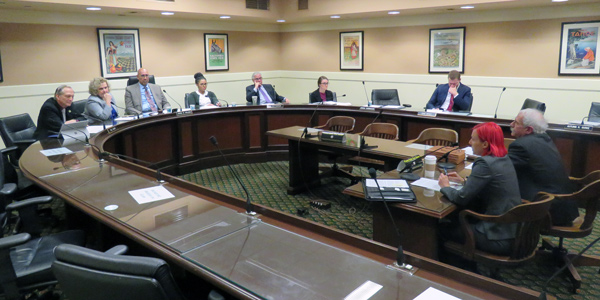By Jason Fordney
SACRAMENTO, Calif. – California regulators and lawmakers are sounding the alarm over a possible decline in the financial and credit health of utilities stemming from wildfire risk and liability.
During an informational hearing Monday, State Assembly members expressed concern over the finances of the state’s investor-owned utilities due to their potential liability for a series of devastating wildfires in 2017.
Utilities and Energy Committee Vice-Chair Jim Patterson (R) repeatedly asked California Public Utilities Commission (CPUC) President Michael Picker if he would describe the event as a “crisis,” but Picker declined to use that term.
“I think we are headed toward bankruptcy for IOUs,” Patterson said. “I really think this is a crisis and needs a crisis approach to it. I think we need to engage on this seriously.”
“I see a continuum of constraints on utilities,” Picker said, adding that declining credit ratings and financial health will affect their ability to invest in renewables and electric vehicles and to obtain insurance. “Certainly, they are going to find it harder to borrow.”
In response to Patterson’s question about what steps the state is taking in response, Picker said: “I assume that is one of the reasons we are having this conversation here today.”
Pacific Gas and Electric CEO Geisha Williams has been outspoken about the issue of recovering costs related to wildfires. (See Edison International Presses Wildfire Cost Recovery.)
The third prong of that effort appeared to be underway Monday, with discussions at the hearing indicating that utilities have been in contact with lawmakers and are mobilizing a strong effort on the liability and cost recovery issue.
Picker asked the legislature for more guidance on the principle of “inverse condemnation,” the legal provision utilities use to recover wildfire costs. The principle states that “the costs of a public improvement benefiting the community should be spread among those benefited rather than allocated to a single member of the community.”
Picker told RTO Insider that CPUC’s interpretation of inverse condemnation could lead to lengthy litigation, while the legislature can take quicker action.
Utility executives have criticized CPUC’s decision to deny San Diego Gas and Electric $379 million in cost recovery stemming from 2007 fires, rejecting the utility’s inverse condemnation argument. (See Wildfires Color California PUC Utility Decisions.)
And the money at stake in that proceeding does not include additional potential liability for billions of dollars of costs from devastating fires that raged across California in 2017, the causes of which are still under state investigation.
Fitch Ratings on Monday downgraded PG&E to BBB+ and placed it on negative credit watch, while also putting Edison International subsidiary Southern California Edison on credit watch based on wildfire risks. In addition, utilities are facing multiple civil lawsuits over the fires, and analysts are also scrutinizing the credit ratings of California cities and localities, according to press reports.
Utilities and Energy Committee Chairman Chris Holden (D) told Picker he plans another conversation on inverse condemnation, as well as discussions on “new legislation that gives you new direction on what the good, the bad and the ugly of what that represents.”
“This will not be the first and last discussion we will have on this topic,” Holden said, later adding that, “we are all trying to get our arms around the issue and how it has so many different components to it.”
Holden said that when the legislative session ended last year, “this was not necessarily the topic I thought was going to take up all the energy for us.” He is also leading a separate effort to spearhead the regionalization of CAISO. (See Calif. Lawmakers Relaunch CAISO Regionalization.)
Speaking at the hearing, CPUC Director of Safety Elizaveta Malashenko said preparedness and rapid response are keys to preventing disasters. Utilities are using new data collection technologies and practices to prevent fires, for example by proactively de-energizing lines for risk reduction, a program CPUC approved for SDG&E.
“When you are talking about wildfires, you are talking about a race against time,” Malashenko said. The CPUC has increased its information sharing with the California Department of Forestry and Fire Protection, she said, and is investigating utility involvement in the 2017 fires. “It has been a very fruitful relationship,” with Cal Fire better preparing for and responding to fires, she said.







